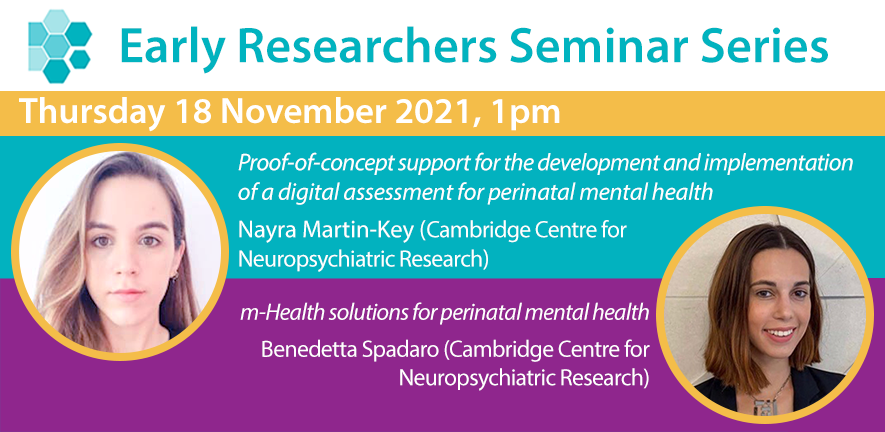
Thursday 18 November 2021, 1pm - 2pm
Proof-of-concept support for the development and implementation of a digital assessment for perinatal mental health: mixed methods study
Dr Nayra Martin-Key (Cambridge Centre for Neuropsychiatric Research)
m-Health solutions for perinatal mental health: a scoping review and appraisal following the MIND framework
Benedetta Spadaro (Cambridge Centre for Neuropsychiatric Research)
Chair: Dr Alecia-Jane Twigger (Pharmacology)
Meeting link
The Zoom meeting details can be found on this page (Cam only; Raven login needed): https://www.repro.cam.ac.uk/erss-2021-22-zoom-meeting-details. If you don't have a Raven login, please email Christina Rozeik to receive the Zoom meeting link for this year's seminars.
Speakers and abstracts
Proof-of-concept support for the development and implementation of a digital assessment for perinatal mental health: mixed methods study
Dr Nayra Martin-Key (Cambridge Centre for Neuropsychiatric Research)
The aim of this study was to conduct a mixed methods evaluation of the current state of perinatal mental health care provision in the United Kingdom, as well as users’ (women and partners) and midwives’ interest in using a digital mental health assessment throughout the perinatal period. Women, partners, and midwives were recruited to participate in the study, which entailed completing an online survey. Quantitative data were explored using descriptive statistics. Open-ended response data were first investigated using thematic analysis. Resultant themes were then mapped onto the components of the Capability, Opportunity, and Motivation Behavior model. A total of 829 women, 103 partners, and 90 midwives participated in the study. The provision of adequate perinatal mental health care support was limited, with experiences varying significantly across respondents. There was a strong interest in using a digital mental health assessment to screen, diagnose, and triage perinatal mental health concerns, particularly among women and midwives. Identified benefits and barriers mainly related to physical opportunity (eg, accessibility), psychological capability (eg, cognitive skills), and automatic motivation (eg, emotions).
About Nayra Martin-Key: I am a postdoctoral researcher at the Cambridge Centre for Neuropsychiatric Research, led by principal investigator Professor Sabine Bahn. My main interests regard developing and using digital technologies to screen, diagnose, and triage mental health concerns, particularly in regards to women’s health. Furthermore, I am interested in patient and public involvement and in using co-designing approaches to develop technology. I have experience conducting mixed-methods research to evaluate the acceptability and perceived facilitators and barriers to using a digital mental health assessment throughout the perinatal period. I also have experience conducting systematic reviews of diagnostic test accuracy, as well as evaluating technologies such as mobile applications for mental health.
m-Health solutions for perinatal mental health: a scoping review and appraisal following the MIND framework
Benedetta Spadaro (Cambridge Centre for Neuropsychiatric Research)
Background: Digital mental health tools, such as applications (apps) could provide an option for accessible perinatal mental health screening and assessments. However, there is a lack of information regarding the availability and features of perinatal app options. Objective: To evaluate the current state of diagnostic and screening apps for perinatal mental health available on the Google Play store (Android) and Apple App store (iOS), and to review their features following the operational framework Mhealth Index and Navigation Database (MIND). Methods: Following a scoping review approach, the Apple App store and Google Play store were systematically searched to identify perinatal mental health assessment apps. 14 apps met inclusion criteria, were downloaded, and reviewed in a standardized manner using the MIND framework. The framework comprised 107 questions allowing for a comprehensive assessment of app origin, functionality, engagement features, security, and clinical use. Recommendations: Our results indicate that there are opportunities to improve perinatal mental health assessment applications. To this end, we recommend 1) focusing on the development and validation of more comprehensive assessment tools, 2) ensuring data protection and safety features are adequate for the intended app use, and 3) improving data sharing features between users and healthcare professionals for timely support.
I am a research assistant at the Cambridge Centre for Neuropsychiatric Research, led by principal investigator Professor Sabine Bahn. My primary research interest is to design evidence-based digital tools that can aid triage and treatment of psychological conditions. I have conducted systematic reviews and worked on both qualitative and quantitative studies to define the feasibility and validity of digital mental health tools for the general population and the perinatal population. I am interested in any collaborations aimed at exploring the use of digital technologies to improve women’s health, raise awareness and fight the stigma related to women’s physical and mental health concerns.
The Early Researchers Seminar Series (ERSS) is a platform for PhD Students and early career researchers (ECRs) at the University of Cambridge with research foci on reproduction to share and discuss their research with other academics from a range of disciplines also researching reproduction at the University. Seminars are held on Zoom on the thirdThursday of every month, 1pm - 2pm. For more information, and for the full 2021 - 2022 programme, please see the main ERSS page.



